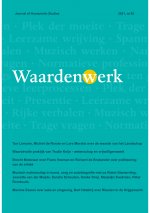
The lived experience of paradise as pause and paradox
Productgroep Waardenwerk 2021 85Omschrijving
Scholars have long documented the connectedness to nature as a critical factor for stimulating and maintaining human health and wellness (e.g., Mitchell, 1946; Searles, 1972; Rapport & Whitford, 1999). Both people’s lived experiences and ubiquitous media reports of sever and ongoing environmental degradation and ecological loss in general and climate change in particular (Cunsolo & Ellis, 2018) resulting from patterns of unsustainable behavior have triggered a range of emotive responses in people. Examples of emotive responses to these
undesired transformations include feelings of anxiety, despair, and apathy, affecting psychological, physiological, and spiritual dimensions of health and wellbeing (Galway et al., 2019). Against the backdrop of the negative ecological impacts on both one’s habitat and proximate and distant natural environment that are characteristic of the Anthropocene, scholars have developed a range of conceptualizations on the nexus between ecosystem health and human health over especially the past two decades, including eco-anxiety, environmental
melancholia, ecological grief, and solastalgia (see Lertzman, 2015; Cunsolo & Ellis, 2018; Albrecht, 2019). These conceptualizations are part of an emerging palette of so-called ‘psychoterratics’, defined as Earthrelated mental illnesses, syndroms, states, emotions, or conditions where people’s mental and physical wellbeing are threatened by the severing of ‘healthy’ links between themselves and their home or territory (Albrecht, 2005: 54; Albrecht et al., 2007: S95).
During the first months of 2020, governments worldwide have implemented policies of lockdown in order to contain the COVID-19 pandemic. These lockdowns have had monumental impacts on people’s daily lives and has brought a substantial part of economic activity and its inherent negative ecological implications and destruction of ecosystems that is characteristic for the Anthropocene to a halt. As a result, the world has experienced an episode of remarkable ecological restoration, unprecedented in the era of the Anthropocene.
